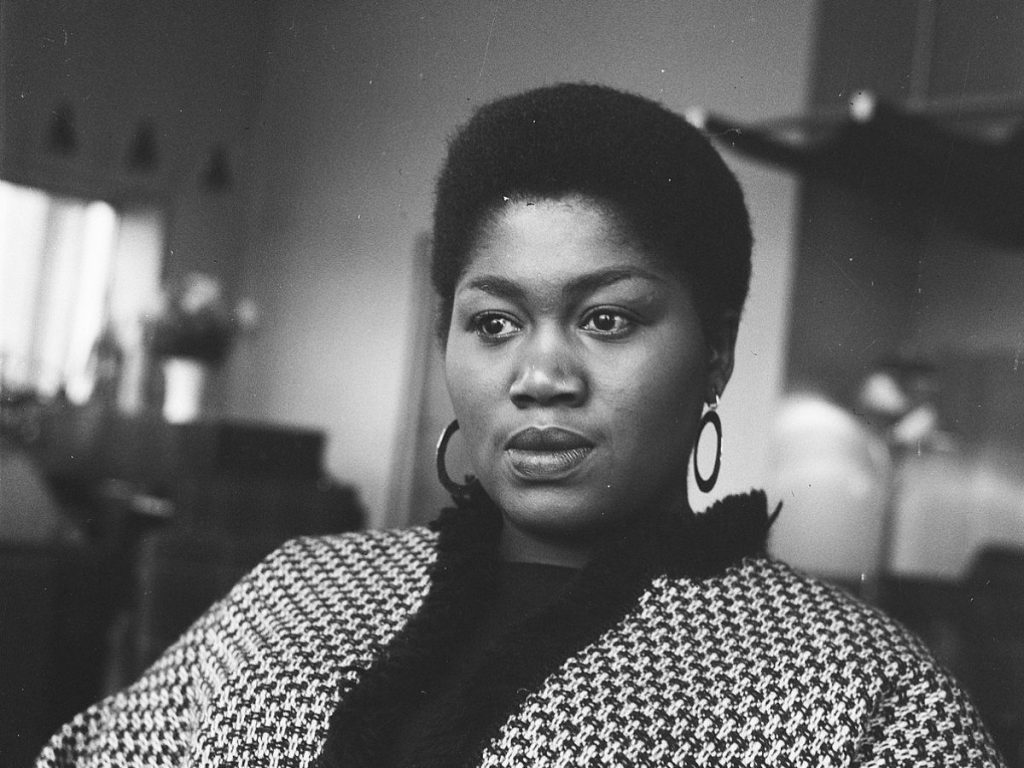Solo legacy artist Odetta is the subject of part eleven of our FARHOF series. A solo legacy artist is a performer whose initial impact on the genre was at least 45 years prior to the year of Induction.
* * * * *
It was 1973 and The Greatest Songs Of Woody Guthrie was playing on the stereo. The album provided background music while I was doing some household chores. The vinyl record had been playing for a few minutes when another track started. A slow, steady bass rhythm introduced the song, soon followed by a soulful female voice singing:
It’s a mighty hard row my poor hands have hoed
My poor feet have traveled a hot dusty road
The song was “Pastures of Plenty” and the singer was Odetta. In those first two lines she vocally established the pride, pain, and dignity deep-rooted in the nomadic life of a migrant worker. She also displayed her talent for making a statement on the human condition through song. If the song was about people living in poverty, she conveyed the image of one living in poverty. If the song was about someone like John Henry who was determined to succeed against all odds, her voice conveyed that sense of determination.
Odetta Holmes was born on December 31, 1930, in Birmingham, Alabama. Her father, Reuben Holmes, died when she was very young. Her mother, Flora Sanders, moved the family to Los Angeles when Odetta was six. On Saturday afternoons, Odetta and her sister, Jimmie Lee, would listen to the Metropolitan Opera. On Saturday nights the sisters would listen along with their stepfather, Zadock Felious, to the Grand Ole Opry.
Odetta’s love of music translated into piano and classical voice lessons when she was a teen. Folk music was gaining renewed popularity in the late 1940s in large part because of the popularity of The Weavers. Nonetheless, she considered folk songs to be lowbrow fare despite having listened to the Opry as a child.
Her opinion of folk music changed in July 1951, when she visited San Francisco as part of a summer-stock performance of Finian’s Rainbow. There she met up with Jo Mapes, a childhood friend. The two stayed up one night at Mapes’ apartment singing blues or gospel songs like “Take This Hammer,” “Another Man Done Gone,” “I’ve Been ’Buked and I’ve Been Scorned,” songs that were being accepted as folk. It was an awakening for Odetta.
“In the songs I heard that night, including prison songs,” Odetta told Sing Out! magazine, in 1991, “I found the sadness, the loneliness, the fear that I was feeling at the time. It turned my life around.”
Odetta merged her newfound appreciation for blues, gospel, and folk with her classical voice training to give songs like “Waterboy,” “Another Man Done Gone,” “John Henry,” “House Of The Rising Sun,” “Pastures Of Plenty,” and many others a clarity and intensity that set them apart from other renditions. However, many critics said her recordings rarely captured the impact of her live performances. Nonetheless, many of her songs, such as “Hit or Miss,” “This Little Light of Mine,” “Glory, Glory” and “Oh Freedom” became folk music classics.
Odetta sang “Oh Freedom” at the March on Washington, the Civil Rights Demonstration led by Dr. Martin Luther King in 1963. Later that same year she appeared with President John F. Kennedy on the civil rights special Dinner With The President. Two years later she sang for the protestors who were marching from Selma to Montgomery, Alabama.
It was these appearances and her continued commitment that earned her the sobriquet The Voice of The Civil Rights Movement. However, she described herself as merely being “one of the privates in a very big army.”
Throughout her career, Odetta toured and performed with Harry Belafonte, Pete Seeger, Count Basie, Langston Hughes, Jewel, Sonny Terry, the Rochester Philharmonic Orchestra, Roger McGuinn, and numerous others. She also appeared in movies from 1954’s The Last Time I Saw Paris to the TV movie The Autobiography Of Miss Jane Pittman.
In 2001, two days after the 9/11 attacks, David Letterman asked Odetta to become the first artist to perform on his show upon its return to the airwaves. Backed by the Boys Choir of Harlem, she performed “This Little Light of Mine, “We Shall Overcome” and “Amazing Grace,” songs that helped America heal from the tragedy.
Odetta continued to perform right up until shortly before her death. Her last performance was at Hughes Room in Toronto on October 25, 2008. It was her hope to perform at Barack Obama’s inauguration on January 20, 2009. Unfortunately, she was plagued by heart disease in her later years and succumbed to it on December 2, 2008, less than a month shy of her 78th birthday.
The artists who named Odetta as an influence are numerous and include Harry Belafonte, Joan Baez, Janis Joplin, and Carly Simon. As for her influence on the world, Maya Angelou said it best: “If only one could be sure that every 50 years a voice and a soul like Odetta’s would come along, the centuries would pass so quickly and painlessly we would hardly recognize time.”
Next up – Oscar Brand

